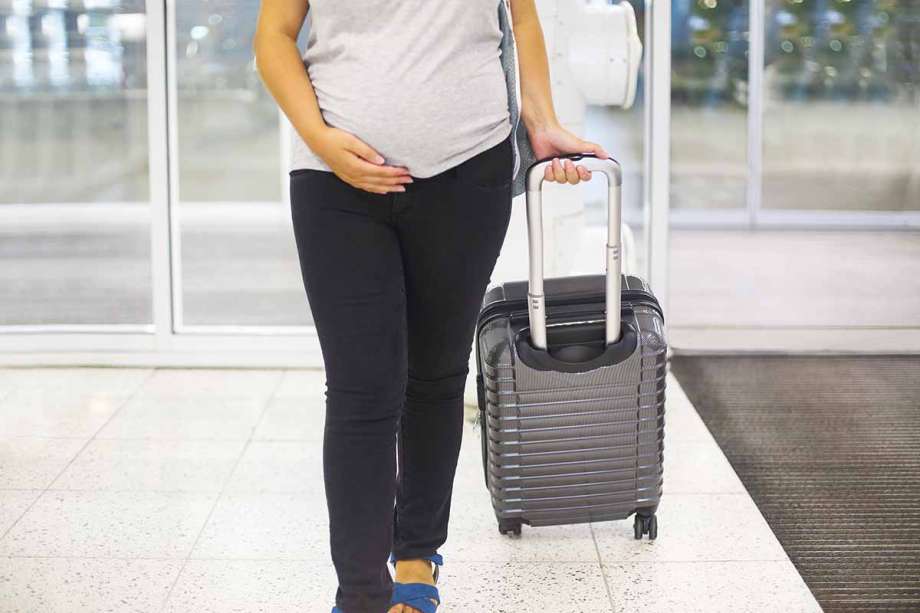Flying While Pregnant: Is it Safe? What You Need to Know

From the moment you find out you're pregnant, your life changes. You suddenly have another person to consider with every decision you make. Pregnant women have a lot on their plate when it comes to their health and their baby's health. Many women wonder if they can still do the things they used to, including air travel or if that will prevent them from having a healthy pregnancy.
More: Can You Drink Coffee While Pregnant?
We all know life goes on during pregnancy and that includes air travel. Whether you're looking to catch a flight for business or pleasure, here are the things to consider if you're wondering if flying while pregnant is safe during the first trimester or up to your due date.
Do Airlines Allow Pregnant Women to Fly?
According to the American College of Obstetricians and Gynecologists (ACOG), most airlines allow pregnant women to fly from their first trimester through the third trimester until they are in their 36th week of pregnancy. But, some international flights may restrict travel during pregnancy sooner. ACOG recommends checking with your specific airline to see what their rules are for air travel while pregnant.
Many pregnant women worry about wearing the airline seatbelt while in flight. The ACOG recommends that all pregnant women wear their seatbelts while sitting on the plane. This is to prevent any injury that may occur if there is turbulence during the flight. Put the safety belt under your abdomen and position the shoulder harness between your breasts for the best fit.
Flying During Your First Trimester
If you're in good health and your OB-GYN gives you the green light, flying during your first trimester is generally safe. According to the ACOG, there is no increased risk of radiation exposure or metal detectors harming you or your baby, nor are there any issues with cabin pressure or noise vibration.
Women who are considered a high-risk pregnancy generally are advised not to fly. This includes women who have high blood pressure, sickle cell disease, or a risk of premature labor. Your OB-GYN will discuss all the risks with you which will determine whether you'll be able to travel while pregnant.
Many women worry about swelling and the risk of blood clots while flying because they're sitting for a long time. All air travelers, as well as pregnant travelers, should be aware of any blood clots forming due to sitting for a long time. If you can, book an aisle seat so that you can get up and take walks up and down the aisles to keep the blood flowing. Wearing compression stockings can also help to prevent blood clots.
You also want to drink plenty of water to avoid getting dehydrated. If you're prone to morning sickness during your first trimester, ask your OB-GYN about any anti-nausea medicine that's safe in case you get motion sickness too. If possible, avoid morning flights to minimize the risk of getting nauseous.
Flying During Your Second Trimester
The second trimester (14-28 weeks of pregnancy) is usually the sweet spot of the pregnancy and usually the best time to fly. Morning sickness has typically subsided and you don't have the backaches or pressure on your abdomen that you're going to experience during your third trimester. You should have a good amount of energy and be able to get around.
The same advice applies when it comes to trying to book an aisle seat to walk around easier and prevent blood clots. You can also wear compression stockings during your second trimester if they're comfortable for you.
When booking your trip, you'll want to know where the nearest hospital is just in case of an emergency. If you're planning on international travel, your OB-GYN may be able to help you find a healthcare provider for when you're away.
Flying During Your Third Trimester
This is when things can start to get tricky. As we mentioned above, most women are clear for air travel up to 36 weeks of pregnancy. But, they can change if you're at risk for preeclampsia, placenta previa, or gestational diabetes. Your OB-GYN will likely put the kibosh on any air travel during pregnancy at this point to prevent any pregnancy complications.
If you are cleared to take a trip during your third trimester you'll definitely want to know where the nearest hospital is and have a healthcare provider on speed dial. We all know babies have minds of their own and may come earlier than your due date. While you can't predict what they'll do, you can be as prepared as possible.
Flying While Pregnant During COVID-19
If travel during pregnancy wasn't enough to worry about, the coronavirus brings even more concerns. According to the Centers for Disease Control and Prevention, the coronavirus does pose more of a risk for pregnant people. Pregnant women have a greater chance of getting sicker, being hospitalized, and even spending time in the ICU. The CDC currently does not recommend travel until you are fully vaccinated. This is two weeks after the last dose of your vaccination. Your OB-GYN will advise you about whether it is safe for you to get the COVID vaccine while pregnant and how you should proceed with air travel.
FAQs for Flying While Pregnant
Do I need a check-up before taking my trip?
It's generally a good idea to see your OB-GYN before air travel. He or she can check if you're up-to-date on your vaccinations and whether you're in generally good health.
Why does my OB-GYN need to check my vaccinations before I travel?
Depending on where you're going, you may need additional vaccines. This is especially true if international travel is on your itinerary.
What should I watch for while traveling that may indicate a problem?
According to ACOG, you'll want to keep an eye out for:
- Vaginal bleeding
- Pelvic pain
- Membrane ruptures
- Severe vomiting and/or diarrhea
- Signs of deep vein thrombosis (DVT) (blood clots forming)
If you experience any of these symptoms while traveling, you'll want to contact a healthcare provider as soon as possible.
Are plane cabins safe for pregnant women?
Yes, plane cabins are safe for pregnant women. Lower air pressure during a flight can reduce the amount of oxygen in your blood, but your body will adjust. When you're at a higher altitude, radiation exposure increases, but shouldn't be a concern if you're pregnant.
When is it not a good idea to fly while pregnant?
If you have a pre-existing condition or pregnancy condition that could get worse when you fly, stay grounded. Your doctor should certainly let you know if that's the case well before you book your flight.
What are the best ways to stay comfortable while flying?
Booking an aisle seat can help immensely because you can get up and take a walk around the cabin when it's safe. Stretching in your seat is also a good idea. If you're lucky enough to have an empty seat next to you, use it to stretch out. Also, keeping hydrated can keep you feeling good all-around.
Final Thoughts
If you're thinking about flying while pregnant, always talk to your OB-GYN before so that you can talk about any risks or problems that may make flying dangerous. Consider that flying during your second trimester is generally the best and safest time to fly during pregnancy. When you're in your third trimester, flying may become more uncomfortable and there could be greater risks involved. There's also always the chance that you could deliver before your due date. That's why you want to know where the nearest hospital is and be aware of local healthcare providers.
In the end, always keep your health and your baby's health a priority when flying and remember to listen to your doctor before booking any flights. If you decide to travel after your bundle of joy arrives, check out How Early Can Infants Fly on Planes?

